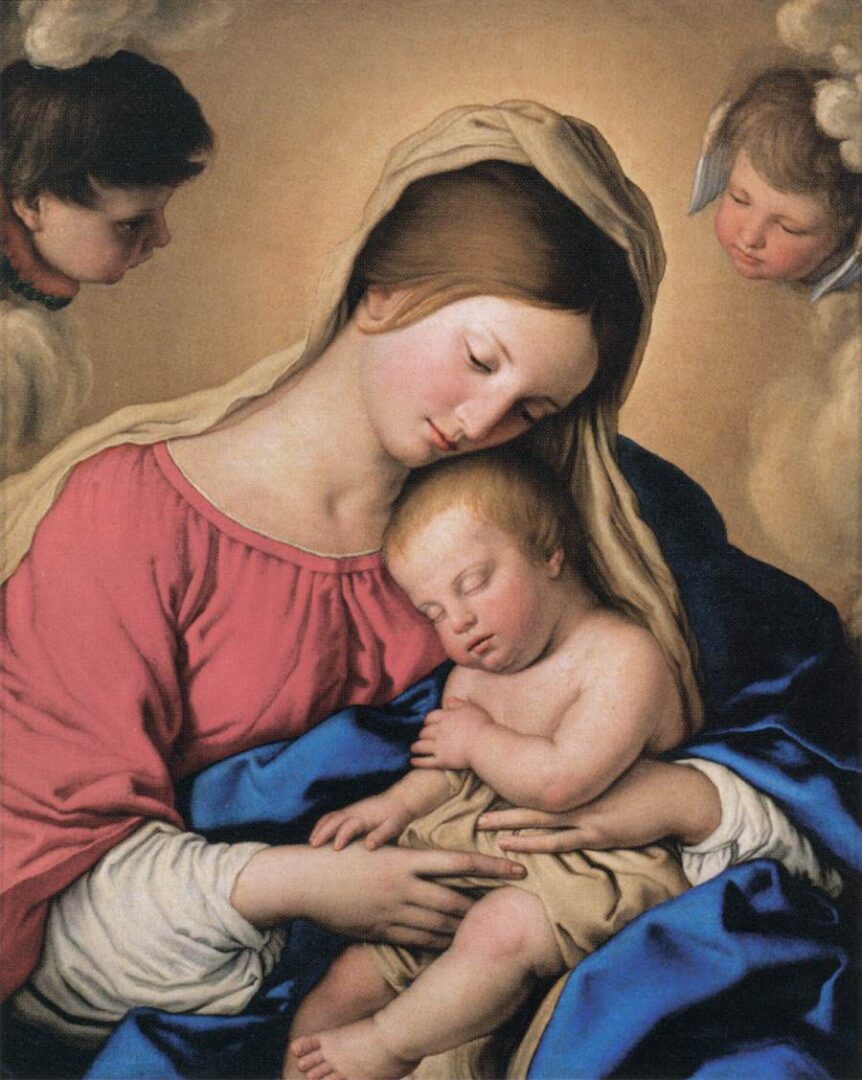The Church is all about motherhood in many different senses of that term. We call her “Holy Mother Church” because in a real, even if spiritual sense she is our mother. That is, she gives us life at the baptismal font (in a way parallel to the way a biological mother gives birth); she feeds us with the very Bread of Life in the Blessed Sacrament (in a way parallel to the way a mother nurses and feeds her baby); she tends to us when we are spiritually ill from sin or physically ill, through the sacraments of penance and anointing (in a way a mother stays by the bedside of her sick child); she never abandons her children no matter what they’ve done, through the ongoing preaching of priests for conversion and forgiveness in the confessional (in a way parallel to the way a mother never forgets her children); and she is always there in the times of greatest need. As an aside, I tend to cringe when people call Mother Church “it” instead of “she,” as if she were a mere institution, such as a governmental agency. So I always use the traditional way of referring to her. It is as if people called my late biological mother “it” instead of “she.” That would not go well for them.
By the same token, the Church has always revered the motherhood of the Blessed Virgin Mary. In many ways, the motherhood of Mary and the motherhood of the Church are almost inseparable. God Himself chose Mary to be the mother of His Son and endowed her with all the graces necessary for that astonishing mission. We even know that He freed her from the stain of any sin from the very beginning of her life, so that she could execute that mission unhampered by sin’s ill effects.
This is speculative, but we can imagine that the love of Mary would have overflowed not just within the Holy Family, but also throughout the village of Nazareth where she lived. I suspect that if there were any villager sick, in need, or just craving a listening ear, Mary was there.
That has ramifications for our own lives: especially for those who are mothers, we know that God will equip you with the graces needed to execute your mission to be the heart of love in your families and a model of concern for those in need. With the help of regular confession and frequent prayer for those under your care, any effects of sin can be overcome and the love of the Blessed Virgin can be reflected in your own life. It almost goes without saying that you should pray through her intercession often (if not daily) to keep your heart open to those all-important graces.
For all of us Christians, we have the confident knowledge that the love of the Blessed Virgin is not limited to those in the village of Nazareth she knew when she walked this earth. From His saving Cross, Our Lord entrusted all of us to her maternal care, which she still extends to us as she is seated at His right hand in Heaven.
On this Mothers’ Day, as we pray for our mothers, we also pray for an increase in devotion to Mary our Mother. I want to leave you with some brief excerpts from a reflection from the Magnificat devotional magazine (dedicated to Mary), written by Venerable Fr. Jean-Claude Colin, S.M. (a 19th century French priest and founder of a Marian religious order). It was addressed to his novices in that community, but it applies to us as well. He stresses in this beautiful reflection that, just as Christ Himself chose in His childhood to be dependent on the love and care of the Virgin Mary, so should we in our spiritual lives. It is a bit sentimental (people of German background like myself always find the French to be a bit sentimental!) – but then who isn’t sentimental about his own mother?
What have we to fear? The Blesssed Virgin is leading us. She is saying to us, “I am marching ahead of you.” Gentlemen, given that thought –the Blessed Virgin is marching with me—who would not feel full of courage and of confidence in any trial? And then, if I reflect on the name I bear [that of Christian], what a source of hope, of reassurance! But the name is no longer enough. For I profess to belong to Mary, and I want to profess my belonging to her even more. I want my devotion to her to redouble, that my dependence on her be total and continual. I shall always hold her by the hand. In my troubles, in my difficulties, I shall say to her, “Blessed Virgin, help me, I falter. I cast myself in your merciful lap, help me to pick myself up again.”
